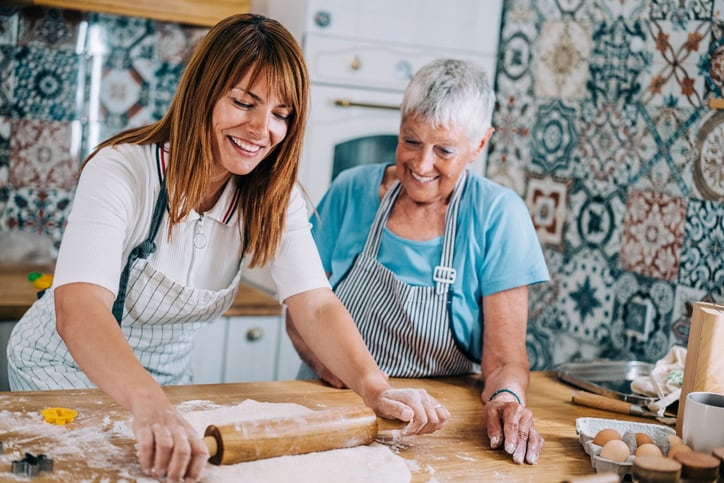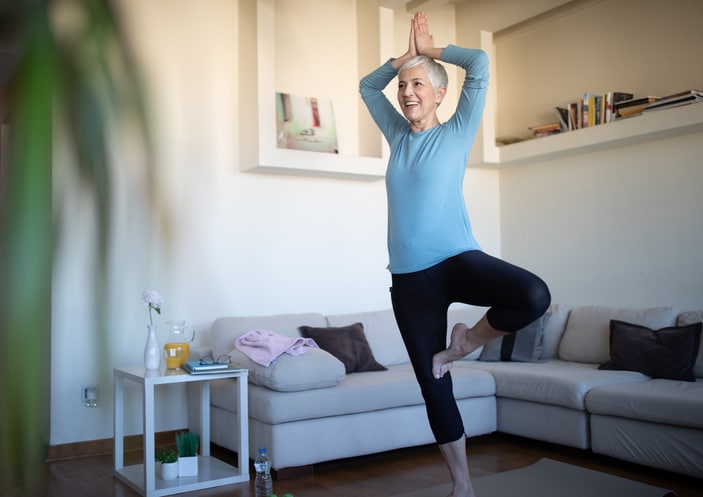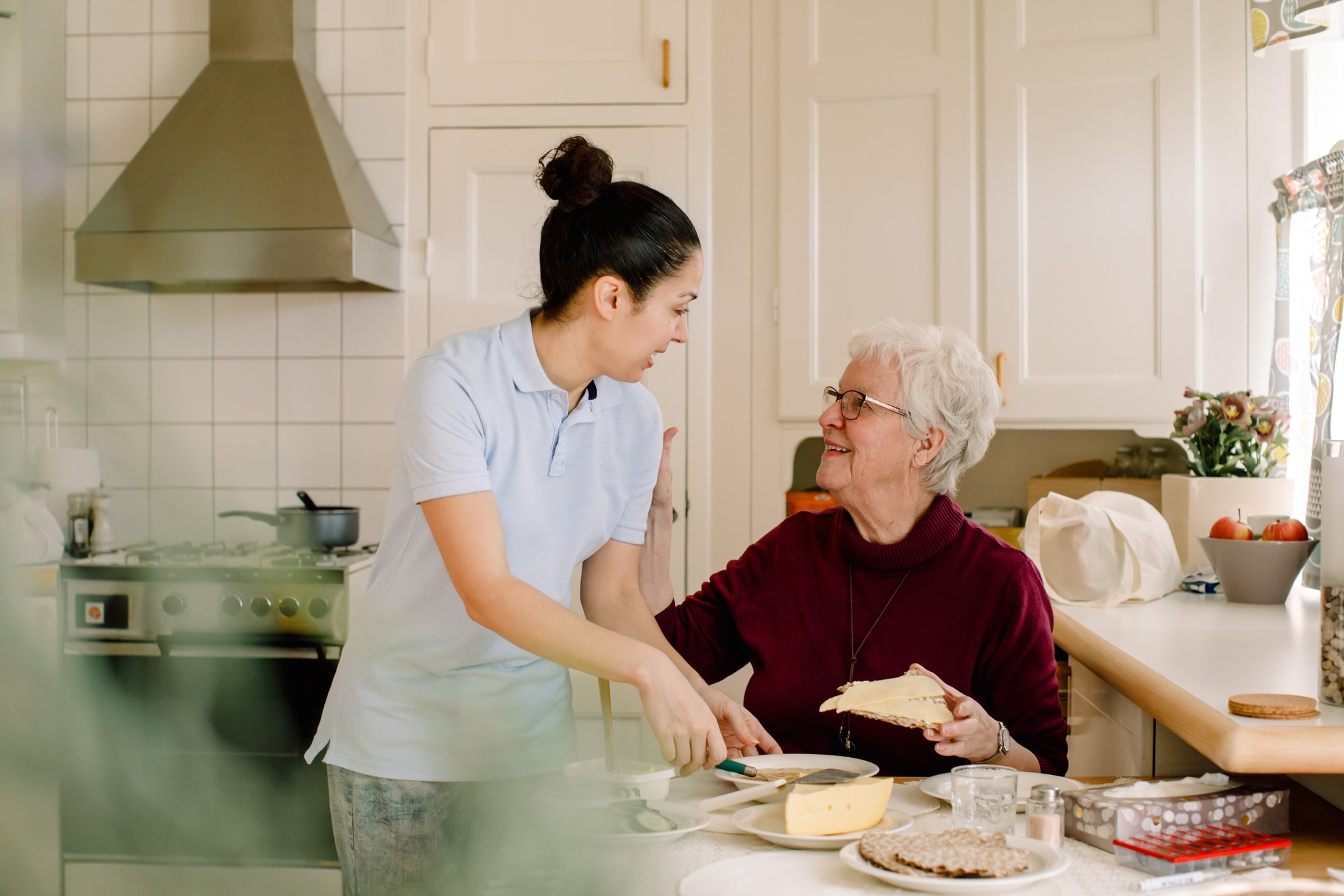In this article
- How to choose activities for seniors with dementia
- Physical activities for seniors with dementia
- Memory activities for seniors with dementia
- Passion-focused activities for seniors with dementia
- Brain-stimulating activities for seniors with dementia
- Household activities for seniors with dementia
- The bottom line on activities for seniors with dementia
When a senior develops cognitive issues like dementia, these complex conditions can shift significantly over time — even day-to-day — leaving family caregivers struggling to adapt and keep them engaged. “As dementia progresses, an affected individual’s cognitive and physical skills decline, and activities a person once enjoyed may become too difficult or cause frustration,” says Monica Moreno, senior director of care and support at Alzheimer’s Association.
It can take some creativity and experimentation, but trying out new activities can benefit a senior with dementia and their caregiver. Here, experts share tips and recommend 14+ activities for seniors with dementia.
Key takeaways
- There’s no single “best” activity for older adults who have dementia. The disease affects everyone differently, and abilities change over time. A person-centered approach that taps into an individual’s past interests, hobbies and preferences is most effective.
- Activities like listening to familiar music, engaging with photo albums or using sensory prompts (like nature sounds or scents) can evoke emotional memories and improve mood and engagement.
- Easy puzzles, sorting, memory matching or other light games can foster mental stimulation, hand-eye coordination and a sense of accomplishment — particularly when done together with a caregiver or family member.
- Gentle physical activity (like short walks or gardening) and everyday chores (folding laundry, setting the table) help seniors who have dementia feel useful and connected to daily life, while also providing sensory and emotional benefits.
How to choose activities for seniors with dementia
Before we dive into activities, it bears noting that the experts we interviewed emphasized the importance of tailoring activities to a senior’s current needs, interests and abilities. And even that can change day by day.
“People living with dementia will have good days and bad days,” Moreno explains, and what works for a senior with dementia one day might not work the next.
Unpredictability accompanies cognitive decline. “As dementia progresses, patients may become agitated and even aggressive, and it is difficult for caregivers to remember that such disruptive behaviors are part of the disease and not intentional,” says Dr. Gary Small, a professor, Alzheimer’s researcher and academic chair of psychiatry at Hackensack Meridian School of Medicine.
That said, family caregivers will find more success if they’re flexible and don’t take objections to activities personally. “The most important thing is that families and caregivers continue to find new ways to engage and connect with the person, especially as the disease progresses and communication becomes more difficult,” notes Moreno.
Read on for a varied mix of research-backed activities to try with your loved one.
Physical activities for seniors with dementia
Movement does wonders for the body and mind at any age, but exercise comes with especially vital brain-boosting benefits for seniors with cognitive impairment. It’s important to consider a senior’s mobility and safety when selecting physical activities, though even simple, low-impact movement can make a positive difference.
1. Dance
“Dancing to a favorite song will not only boost mood but provide physical exercise that will help the heart to pump oxygen and nutrients to brain cells,” Small suggests.
2. Take walks or mindfulness classes
You could also take your loved one on outdoor walks or attend yoga or tai chi classes together. If your older loved one has mobility challenges, you might also try chair yoga.
3. Stream fitness classes
If leaving the house is difficult, clear some space at home. Many streaming services, like Peloton or Apple Fitness+, offer exercise classes.
Memory activities for seniors with dementia
When family caregivers focus on reminiscing with a senior and finding happy memories still there, it can be comforting to both of them. Plus, family members might learn more about their loved one’s life and feel a sense of much-needed connection.
Memory activities experts recommend include:
4. Look at old photo albums or doing a life interview
Page through stills of heartfelt memories or ask questions about their early life. Or create a memory box they can look at with items from their life.
5. Practice existing skills
Encourage older adults with mild dementia to practice existing skills, whether using a language, applying a particular skill (like woodworking) or talent (like writing).
6. Take a walk down memory lane at the movie theater (or home theater)
Watch their favorite old movies together.
7. Visit a beloved place
Head to a nearby city, museum, beach or other spot where the older adult has happy memories.
“One strategy for connecting with a loved one is to engage in familiar activities — conversations, games, music, art or any pursuit that the patient enjoyed before the dementia developed.”
— Dr. Gary Small, a professor, Alzheimer’s researcher and academic chair of psychiatry at Hackensack Meridian School of Medicine
Passion-focused activities for seniors with dementia
Even as Alzheimer’s disease or other forms of dementia rob a senior of their memories, that person’s lifelong interests didn’t just disappear. “One strategy for connecting with a loved one is to engage in familiar activities — conversations, games, music, art or any pursuit that the patient enjoyed before the dementia developed,” Small says.
8. Do an activity the senior used to enjoy, such as sports
Moreno suggests thinking about what the senior used to enjoy and adapting it to their current abilities. “For example, if someone living with dementia was a big sports fan during his or her life, it may be fun to attend local sporting events,” she says. “As the disease progresses, this may shift to watching games on TV or simply talking to the person about a favorite team or player.”
9. Try music, art or dance
Moreno suggests the same approach for other areas of interest, such as music, art or dance. In the earlier stages of disease, you might be able to bring your loved one to events or attractions in public. As it progresses, you can find ways to bring it into the home, whether through videos, hands-on activities or inviting visitors over, like a violin-playing grandchild or a salsa dancing neighbor.
“Even in the late stages of the disease, finding ways to engage is important. It may be just holding hands or talking to them, but there are ways to engage.”
— Monica Moreno, senior director of care and support at Alzheimer’s Association
Brain-stimulating activities for seniors with dementia
Another key way to keep a senior engaged and potentially slow cognitive decline is to keep using their brain in new and challenging ways, which promote neuroplasticity, or the brain’s ability to adapt and strengthen neural pathways. Caregivers can help seniors with dementia keep their brains active through a variety of activities, many of which can also be a bonding experience with family caregivers.
10. Check out puzzles
One go-to activity is any type of puzzle. “Puzzles can help stimulate the brain and improve problem solving skills,” Small explains. “The level of difficulty of the puzzle should vary depending on the patient’s degree of cognitive decline and previous experience with the particular puzzle. The goal is to train but not strain the brain.”
11. Prioritize various forms of socializing
Some social activities to consider:
- Take your loved one to local events or community groups for peer socialization
- Attend an adult education class to learn new skills together, like crafting or cooking
- Invite over a family member or friend for the senior to interact with
- Set up the senior with brain-stimulating games on their mobile phone or computer, like AARP’s Staying Sharp or BrainHQ.
Household activities for seniors with dementia
To the average healthy adult, everyday to-dos aren’t thrilling tasks to look forward to. But involving your loved one in them can provide mutual benefit; you get chores done, while helping the senior achieve mental stimulation and a sense of accomplishment. Here are some ideas:
12. Cook together
If your loved one has always enjoyed cooking or baking, ask them to help you make something. They’ll get some cognitive and sensory stimulation, and you can enjoy a delicious meal or sweets together. The senior may even enjoy helping with dishes afterward if they’re able to.
13. Tackle simple house chores
A senior with dementia may struggle to learn new skills, but earlier in their disease, they may still be able to do many routine tasks. Ask if they will help you with familiar chores around the house, which can help them feel useful and contributing to the family, and if you do them together, it can be a way to connect. Even just folding clothes, making beds or setting a table can deliver helpful brain stimulation and physical activity.
14. Get outside
“Watering plants is an easy, fun activity that you can do with your loved one, and it’s a great way to do something constructive while getting some fresh air at the same time,” Small says. Plus, it can provide some healthy physical movement and mental stimulation. Gardening together, whether at one of your homes or in a community garden, also comes with social benefits.
The bottom line on activities for seniors with dementia
There isn’t one “best” activity for seniors with dementia; the disease can vary significantly by person, and needs and abilities will shift as their condition progresses. Plus, we each accumulate a lifetime of unique skills, interests, memories and preferences.
That said, as you think about the best activities for your loved one, Moreno recommends taking “a person-centered approach” by utilizing what you know about their hobbies and passions to offer stimulation and engagement.
It’s even better if you can find activities that help you connect and enjoy your precious time together amid the inevitable moments of frustration. “Even in the late stages of the disease, finding ways to engage is important,” Moreno concludes. “It may be just holding hands or talking to them, but there are ways to engage.”
For more inspiration, explore this activity list from Alzheimer’s Association or McGill University’s free, downloadable booklet of activities ideal for family caregivers of seniors with dementia.





